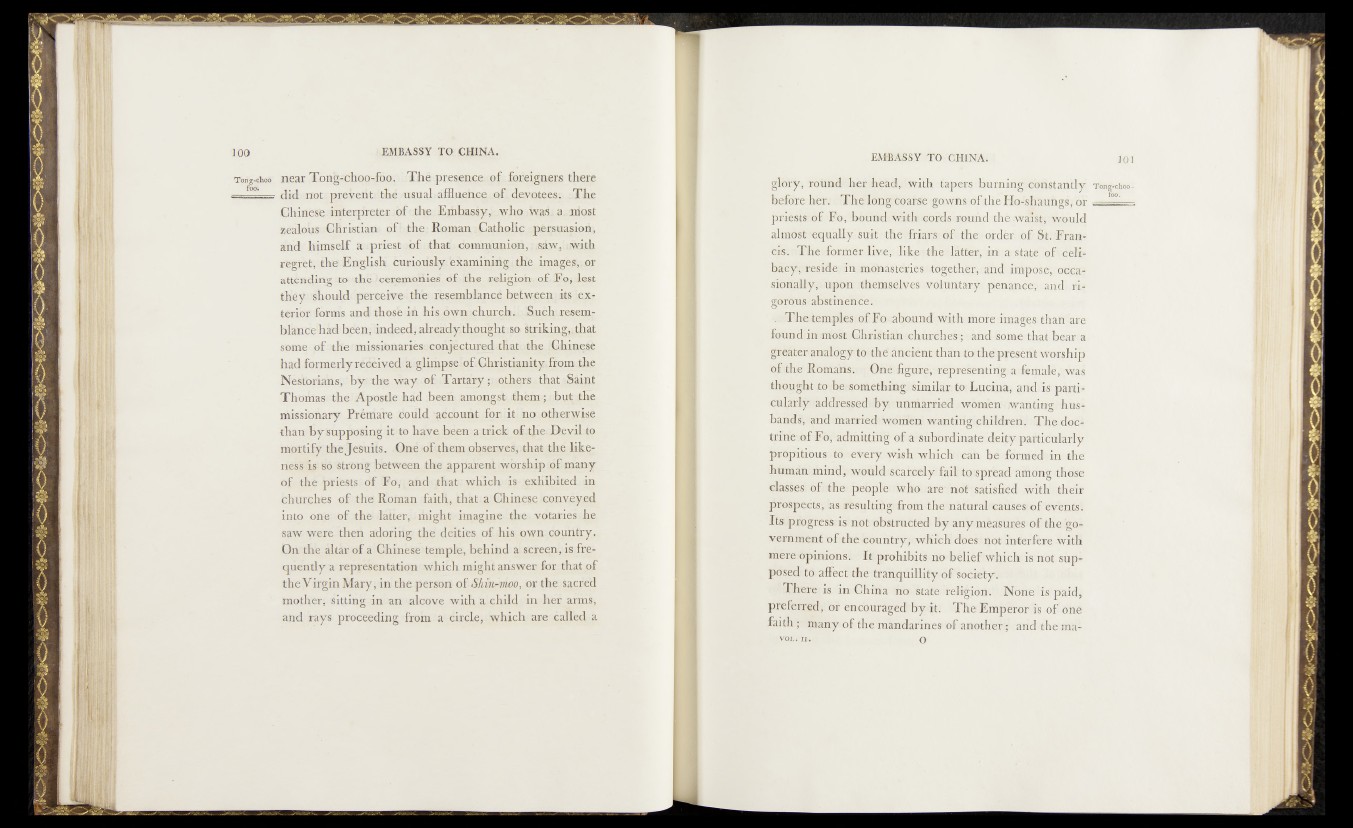
near Tong-choo-foo. The presence of foreigners tlierje
d id iïo t ; prekelitëthëmte^®ffiu||i^|piaf_devotees; The
Chinesb-iteerjireteE ;bfofekp Embassy, ..who a^urfasi
f^löumiGÉristians pfbfhe^ R©mte;CatholIe persuasion,
te d himself aupriest .of that'. communion, ; :sdw,,uwith
regrfet, the* English êuriouslylfeyaminingithfe im&giÉïifflr
a ttè « d * ^ yp nfaMfcerpmoSies
they should perceive thfe'resemblance befcw^BEt^^l^t
tOBdS forms andthosfeih his
bfondeihad bpfen/imdeedj ak ead ^ t|j0 u g h 6m striking, that
some of tho'teissitmariesreonjèctured thatt..the iCidnpsè
had formerlyrédeived as glimpse fof GhTptitelipSomiithe
MêÉbriaks,?h|rs.the -vkiyimf Taröfcy jiüDttqrac that dSaint^
Thoihas the Apostle had been- amongsbAem^ r.biit .the
missionary Prémare could uécburit fo ruit no otherwise
than b y Supposing it to have been a, trick o£. |}ieiiDEyil to
mortify;thbJesuits. .Onëjofthemobsei^es^that thé Likeness
is SO strong between the appaMenf-kcorship d f many
©f- thé pfiéSlS'öf iFov -ted* (that: which-is- e x h ib ite d in
churches o f the Rotote faith, thatt^ Chinese leonvjyp^
into ono o f the lalter, might imagine the* votaries ijuè
saw were then afdoritig the deities of his own coukitry.
On the altar of a Chinese temple, behind a screen, is frequently
a representation which might answer for that of
th eV irg in Mary, in th e person ofuShih-nioo, or the Sacred
mother, sitting in an alcove with a child in her arms,
and rays proceeding from a circle, which are callbd a
EMBASSY TO CHINA. J01
§3#y, soundnherdaead^dwaii Jappr?rhurnmgsebnstanHy’ wn^cheo-
fefdre her. r.'Tka£l©u|^hp,$f|^xgowUS^dhftKe EMshauhgs, or - ■
To, bound" wSthlipuds^round thej(W®tejMsould'
almost^equdfyisuit «t#evfriars? <3%fehexorderly» St;'{Franc
k u¥he®liam©V.l^ inxai^fidie'
ba'eyPEeskdeatiMiMfeas-tdtiiesnfe'Oge^h^ t and! i‘E%os^ o n to
sirdAtty,. upon theimbly es pcnan <fpMg nrl i :tfia -
gbrifos^bfsdneh eeij *
. r-Thotemptesioaf F o«,’.abound? withA,a|e dm ^|^srth
found inmost jfshriSfeiah-rohhr^-te^,^.And*isome that'bea®'a
gBd4teransalpgy^t0Tth€dn®|ent'lhaniitpfek^resehlfcWo!rship
©fithe Romany.'--? One f f g u h e ^ B e p r e s f e n r i ^ w a i
thought forkefesomethinglsimifari feOi<Iijic!pa, |pditi|s? parti?
eu'Pd^tad%eysed^byimnaaiarried *A^Si0afeu?uwayntiirg^husi
bands5, and kragpuedtwoiukrai wteOirfgjehileken: Thadofli
tranlss©! ®b$ admitting ofy?subprdkfafeeidei|;<y partidmlarly
propitious ,'tdoe’v'ery -wish ’Whichceafi- be formed»in the
human mind,' woUldrs^atodiylfalbAaispread- arridngthb^e
classes! o f the .people- ) w hoc are /note jsatis fied .With* their
jkospeets-, lastesultihg? from tbe' nktiiraJ.rcafe'esfof^vhntst
ItapiogEesSfislnotobstaicted by an^mea$imi^bktk®$g$|
vernment o f the honntryjcwhichi does J^OKkiCerfere Wi<t-H
mere opinions. It prohibkf nbEeligf w hickisnof Supi
pdsed tb affect’the-tranquillity 'oFsoc-kiysrit
•'There is in China itoVf tate? religion. paid,
preferred, or encouraged by it: T h e E jf i^ o r f e of! brig
fa ith ; many of the iukridarinesipf a n b th e ^ ' aridet&idf
^g$h$Mu»g$ . | || o4